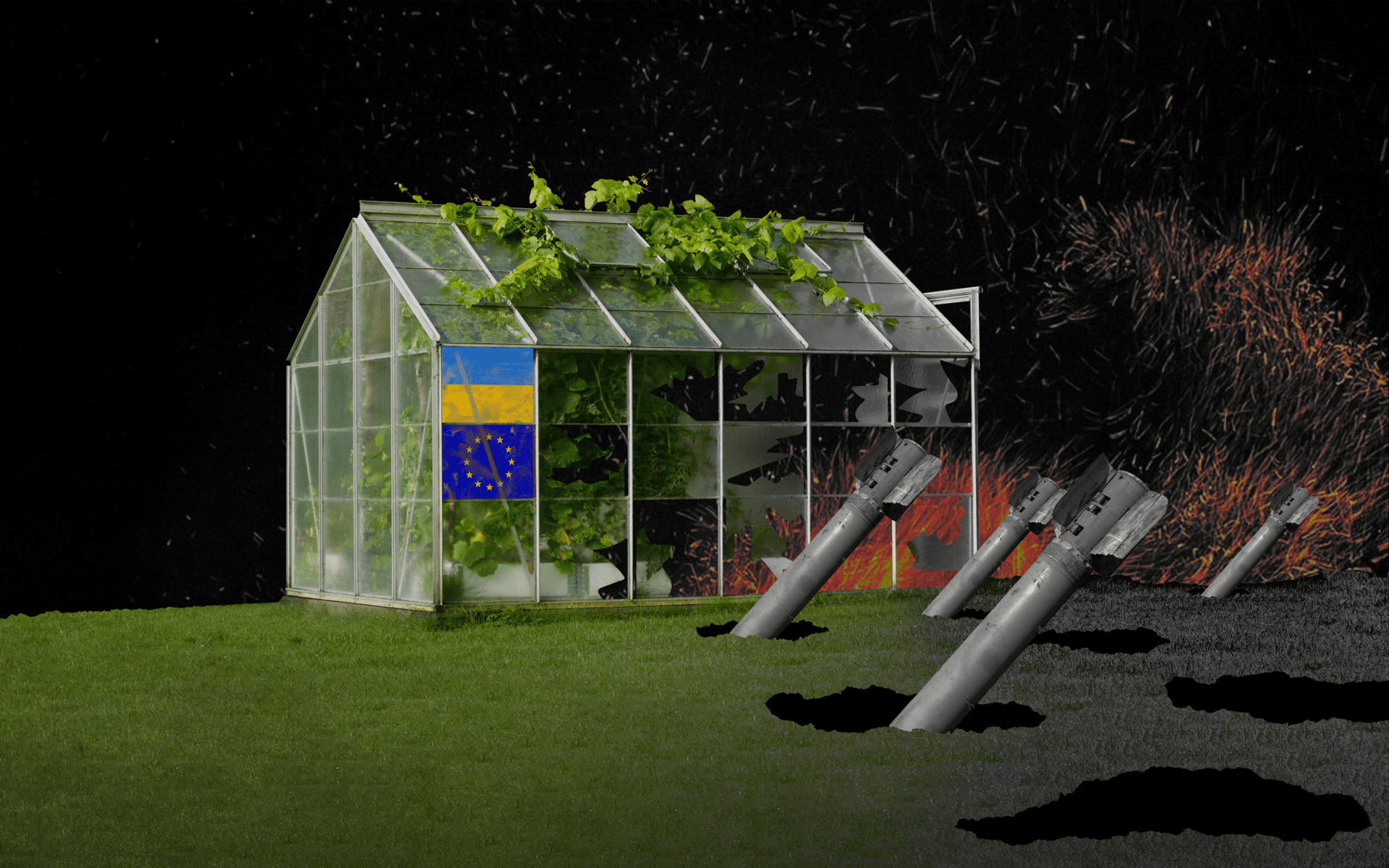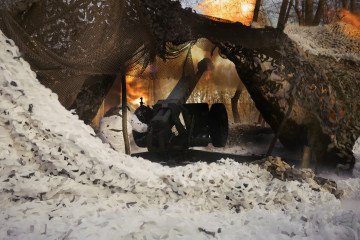- Category
- War in Ukraine
Why Did Russia Invade Ukraine?

For almost three years after Russia's full-scale invasion of Ukraine, many analysts have put forward their arguments regarding the true causes of Russian aggression against Ukraine. While the official "arguments" of the Russian leadership are merely a pretext and justification for the global community and its own population, other reasons, which are often not obvious at first glance, lie behind the curtain of Russian rhetoric.
When Vladimir Putin came to power in Russia in the early 2000s, he seemed not too dissimilar from those now reluctantly labeled as "liberals" in Russia. He condemned Russia's colonial past, declared respect for the borders of other states, and even expressed a desire to integrate with Euro-Atlantic alliances.However, by the end of the decade, Putin aimed to create an alternative to the European Union, known as the Customs Union, built on the foundations of post-Soviet countries. For Putin, Ukraine played a crucial role in this project. However, Ukrainians, with a long history of fighting for independence from Russia, disrupted these plans.
Reforms that complicated the rise of pro-Russian corruption
Despite a portion of Ukraine's population being Russian-speaking, the majority of Ukrainians unequivocally supported European integration. Ukraine was moving toward EU integration, but at the last moment, pro-Russian President Viktor Yanukovych refused to sign the association agreement with the EU.
Protests began in the country, but their brutal suppression escalated into the 2014 Revolution of Dignity—against Yanukovych himself. For Ukrainians, European integration became a symbol of the fight against corruption.
Ukraine created a series of anti-corruption institutions and carried out decentralization reforms, making it harder for pro-Russian politicians to come to power through corrupt schemes.
By staging a revolution against a government building an autocracy similar to Russia's, Ukrainians became an example for the residents of post-Soviet countries, demonstrating that democracy could be defended through protests—a notion that still terrifies the Russian government.
Developing economic independence
After the Soviet Union's collapse, the economies of its former member states remained interconnected, leaning toward dependence on Russia.
However, after 2014, Ukraine began diversifying its economy, leading to a radical restructuring.
Economic ties with Russia, once Ukraine's main trading partner, were significantly reduced. The share of Russian exports in Ukraine's economy dropped from 23% in 2013 to 6% by 2021. Exports to the EU expanded, making the EU Ukraine's largest trading partner, accounting for over 40% of its total exports.
Economic growth was accompanied by advancements in agriculture, construction, entrepreneurship, industrial production, and a booming IT industry, which had more than tripled since 2014, generating significant export income.
The government reduced national debt from a peak of 82% of GDP in 2015 to 50% by early 2022. Simultaneously, the National Bank's foreign reserves grew, and the banking sector underwent reforms.
Ukraine demonstrated to other post-Soviet countries that Russia's economic model, with its political demands, hampers development. Without Russia, Ukraine's governance and citizens' living standards proved vastly superior to those during the Soviet era.
Gas production and energy independence from Russia
Gas is one of Russia's main tools of influence over post-Soviet countries. Gas prices directly impact industries such as chemical production and agriculture.
During the Soviet era, Ukraine was an integral part of a unified energy system, with its gas infrastructure serving as a transit link for Russian gas to Europe. After the USSR's collapse, Ukraine imported about 70-80% of its natural gas needs from Russia.
Domestic production covered only 20-25% of consumption. However, in 2013, Ukraine signed agreements with US-based Chevron and Anglo-Dutch Shell for shale gas extraction in eastern regions, aiming for energy self-sufficiency by 2020.
This scenario was disrupted by Russia's aggression and subsequent occupation of parts of eastern Ukraine in 2014, allowing Russia to maintain its leverage over Ukraine and Europe's internal and external policies.
Today, Ukraine remains one of the main transit routes for Russian natural gas to Europe. Its gas transit system handled significant volumes of Gazprom's exports to European consumers, constituting up to 40% of total exports to the EU by 2021.
Mineral extraction and strategic importance to Europe
Ukraine is one of Europe's richest regions in terms of mineral resources, with significant reserves of metals and minerals, including iron ore, titanium, aluminum, lithium, and rare earth elements.
The development of mining and processing of these resources is strategically important for reducing dependency on Russian resources and integrating them into global supply chains for high-tech products.
For example, Ukraine holds about 20% of the world's titanium reserves, including approximately 900 million tons of ilmenite and rutile. Developing the titanium industry could be key to an economic breakthrough in high-tech sectors, such as aviation, medicine, and defense. Experts estimate that investments in this sector could increase annual export revenue by up to $50 billion by 2030.
Lithium is another critical resource in Ukraine, particularly in Donetsk, Luhansk, and Kirovohrad regions, vital for battery and electric vehicle production. Ukraine also has significant potential in rare earth metals such as scandium and yttrium, which are essential for electronics, magnets, and defense technologies.
Ukraine ranks among the top 10 countries for iron ore reserves, while its manganese deposits are among the world's largest. Additionally, Ukraine is the leading European country and eighth globally in coal reserves.
A global agricultural powerhouse
Thanks to Ukraine's soils, which make up 30% of the world's black soil, and its advantageous geographic location, the agricultural sector is a crucial part of Ukraine's economy and a guarantor of global food security.
Ukraine ranks among the top three global grain exporters, including wheat, corn, and barley. It is also the world's largest exporter of sunflower oil, accounting for up to 50% of the global market.
Ukrainian grain feeds millions worldwide. Egypt, Turkey, and Indonesia are the main importers of Ukrainian wheat, while North African countries like Tunisia and Algeria rely on Ukrainian barley. Rising demand is also evident in Asian countries due to rapid urbanization and population growth.
Before Russia's full-scale invasion in 2022, 90% of Ukraine's agricultural exports passed through Black Sea ports. The blockade of these ports and infrastructure destruction caused a global crisis, driving up food prices and exacerbating hunger in the world's poorest regions.
Disruptions in Ukrainian grain supplies affect global prices for staple crops. For instance, wheat prices rose by 40% after the full-scale war began.
If Russia managed to conquer Ukraine, it, along with other post-Soviet countries, would control over half of the grain market, giving Putin another powerful tool to influence global politics.
Reviving national and cultural identity
Since the 2014 Revolution of Dignity, Ukraine has actively worked to restore its cultural independence from Russia. A significant breakthrough in restoring national identity has been strengthening the position of Ukrainian as the primary language in public spaces, education, media, and culture.
Russia's overarching narrative aims to convince its population and the world that Ukraine does not exist as a distinct nation and that all Eastern Slavs belong to a single people, with Russians as the "elder brother." Ukrainians, however, prove otherwise.
Instead of promoting national prosperity and freedoms, Russia sells ideas of "Eurasianism" and a "great nation," accompanied by excessive corruption and repression. Having a neighboring state that serves as an antithesis to Russia and an example for other post-Soviet countries is highly disadvantageous for the Kremlin.


-0666d38c3abb51dc66be9ab82b971e20.jpg)
-35249c104385ca158fb62273fbd31476.jpg)


-554f0711f15a880af68b2550a739eee4.jpg)

